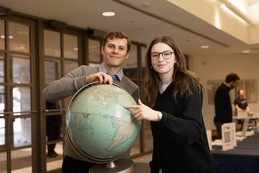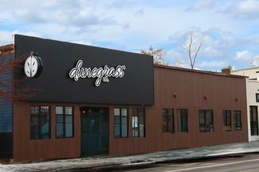Ghost Supper
Oct. 25, 2006
Ghost Supper. The true meaning of these words is open to interpretation, particularly this time of year. For the Halloween-obsessed, visions of white-sheeted revelers come to mind. For the spiritual Odawa Indian community, a Ghost Supper represents much more. It’s the yearly tradition of honoring the departed with a meal and earthly gifts in remembrance of, and in respect to, all those who have passed on.In existence long before foreign settlers arrived on this land, Ghost Suppers have surrendered to minor changes through the years, but the premise remains the same.
“Traditionally, our people used to do annual feasts (in the spring),” says Winnay Wemigwase, director of archives, records and cultural preservation for the Little Traverse Bay Bands of Odawa Indians. “The entire (Native American Indian) community got together and they would actually go to the cemeteries. You would have a feast with the ancestors that were there in the cemetery.”
Ancestors’ remains would be uncovered, and gifts – once-desired items, such as tobacco and cigarettes – would be offered to the departed, as well as to each other. Once a meal was shared, the deceased would be reburied with their gifts.
“When missionaries came…they didn’t like that,” explains Wemigwase. “So, several of our traditions – and the Ghost Supper is one of the major ones – started to incorporate some elements of Christianity. It was a way of adapting and accommodating new beliefs, in order to preserve that tradition.”
ALL SOULS
The Catholic custom of All Souls’ Day (praying for the souls of the departed) normally occurs on November 2, so Ghost Suppers began to take place around that time. And instead of gathering at cemeteries, families began hosting suppers at their houses and leaving ancestors’ remains intact.
Each fall, in mid-October, preparation begins for the approaching feasts. Skilled artisans create small flowered wreaths – approximately eight to ten inches in diameter – out of crepe or tissue paper to be hung on crosses or graves as invitations for deceased ancestors to attend the upcoming Ghost Suppers. Traditional belief is that the wreaths become crowns as ancestors accept their invitations.
“Symbolically, the spirits would turn [the wreaths],” says Wemigwase, “and wear them to the supper.”
Odawa community members may attend as many as three or four Ghost Suppers each weekend at private homes during the month of November.
“Families get together, and [the suppers have] been going on so long in families that people generally have an idea of what their job is every year and they just come together and they do it,” explains Wemigwase, noting that each house prepares the food themselves and often serve is between 100 and 200 people, sometimes into the early morning hours.
“Each of those people that show up represents a spirit that came. And it’s a blessing the more that you have,” explains Wemigwase. “My family has always taught us that you try to go to as many suppers as you can, because it’s a way of showing respect to that family and of honoring them and their relatives.”
GIFTS FOR THE DEAD
A symbolic fire is often lit and maintained outside as an added spiritual tradition. Praying and quiet time near the fire is customary. A large part of the tradition is also the gifts that are set out.
“What you’re trying to do is give those spirits some of those earthly things that they may be missing,” says Wemigwase. Tobacco and cigarettes are important gifts for the adults departed.
“You put candy out for children,” continues Wemigwase. “And as people are sitting there waiting for their turn to eat, they may have some of the candy, and it’s all symbolically feeding those spirits.”
When a seat is available, it is expected that each visitor will take a little bit of everything that is served. What cannot be finished should be offered to the fire.
The night is about fellowship with the living as well as honoring the dead.
“Typically (during supper), the TVs aren’t on, there isn’t really any music going on, because people really enjoy sitting down and being able to visit with people that they haven’t seen in awhile,” says Wemigwase. “For some families, it’s the only time they get together in a year. So, it’s a lot of talking and laughing, you know, having a good time.”
ALL INVITED
For those not involved in the Odawa community who wish to participate, an annual community-wide Ghost Supper has been held at the Crooked Tree Arts Center in Petoskey for over 25 years. This year’s event will begin at 6 p.m. on Friday, October 27 in the arts center’s lower level. Over 250 people attended the supper last year, with as many as 600 in prior years.
The supper is free for all who choose to attend, with funding for the meal provided in part by the Little Traverse Bay Bands of Odawa Indians, Michigan Council for Arts and Cultural Affairs, Victories Hotel and Casino and the Crooked Tree Arts Center.
“We encourage people to bring a dish to pass and they should drop it off before the supper starts,” says Elizabeth Ahrens, executive director of the Crooked Tree Arts Center. “We serve until the food is gone.”
Joe Mitchell, cultural preservation coordinator for the Little Traverse Bay Bands of Odawa Indians, will begin this year’s supper with a native Odawa prayer.
A ceremonial fire will burn outside and in keeping with tradition, the first filled plate with a sample of every food item available – including turkey, smoked whitefish and fry bread – at the supper will be offered to the fire. The door to the arts center will be left open all evening, inviting everyone – including the spirits – to enter.
The musical group Native Visions will be performing throughout the evening with storyteller Tony Miron, women hand drummers Andrea Otto, Vickie Lynn and Virginia, flutist Aaron Otto and drummers Pat and Mike Naganashe.
“(Native American music) is one thing that is unique to the Crooked Tree supper,” adds Wemigwase. “They try to provide some other cultural experiences while people are there visiting.”
In addition to music and storytelling, the Anishnaabek Generations art exhibit opens that evening at the arts center. Visitors are invited to peruse the display of authentic quill boxes, carvings, beadwork, paintings, baskets, woodwork, pottery and dream catchers by well-known and local Native American Indian artisans.
The exhibit will be open to the public through November 25 and is sponsored in part by the Michigan Council for Arts and Cultural Affairs, the Bay Harbor Foundation, Victories Casino and Hotel, MCACA and the Little Traverse Bay Bands of Odawa Indians.
Trending

Michigan’s Marijuana Tax at Work
Cannabis has become a big business in northern Michigan, and local governments are putting tax dollars earned from dispensar… Read More >>
California Sober: Why People Are Switching from Alcohol to Weed
They call it “California sober.” Generally speaking, this term applies to folks who use marijuana but abstain f… Read More >>
The Legacy of Student Activism
“It’s a physical letter to your representative,” Alex Tank says when asked to define the word “prote… Read More >>


